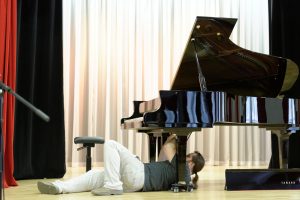Application of Non-Academic Music Practices in Training of Academic Pianists
Doctoral student: Motiejus Bazaras
Supervisors: Prof. Petras Geniušas, Prof. Dr. Rūta Stanevičiūtė-Kelmickienė
Department: Piano
Duration: 2012–2016
Abstract
The present artistic research project is focused on the pianist’s proficiency from the perspective of the balance between the development of technical skills and musical thinking. The choice of the subject was determined by an understanding that proficiency serves as the key characteristic that ensures participation in contemporary music market, challenging pianists to more thrilling means: boundaries of abilities are measured while composers keep incorporating inventive techniques and means of expression looking for ideas in diverse non-academic music cultures, the pianists facing such scores have to penetrate a specific style, master it as persuasively and professionally as possible. The aim is to disclose the possibilities opened by non-academic music performance practices that enrich the technical skills and musical thinking of an academic pianist and substantiate the benefits of versatility of a pianist performer participating in the music market.
The topic is scrutinized in various facets. On purpose to reveal presumable inertia of pedagogy, the culture of piano art is defined as a sphere of social activity using Pierre Bourdieu’s definition and terminology of field sociology. The author investigates the changes of piano repertoire with regard to contemporary music market, as well as the concept of the canon and transformations thereof. On this basis, the results of empirical qualitative and quantitative research were investigated, which sought to identify development trends and attitude towards novelty of the Lithuanian piano pedagogy, along with exhaustive analysis of pianists’ reflections regarding versatile musical profile. Further discussions continued on performance-wise significant principles of musical thinking and perception of music sound, along with historically and ideologically established opposition of methods of performing technique training, as well as the author’s suggestions to apply elements of non-academic music to improve rhythmic and harmonic skills.


